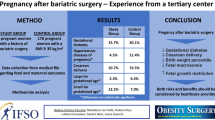Abstract
Background
The objective of this study was to investigate pregnancy outcome of patients following different types of bariatric surgery.
Methods
A population-based study includes all pregnancies of patients with bariatric surgeries delivered during 1988–2008. Pregnancy outcome was compared between the different types of surgeries.
Results
This retrospective study included 449 deliveries: 394 deliveries following pure restrictive operations—laparoscopic gastric banding (LAGB; n = 202), silastic ring vertical gastroplasty (SRVG; n = 136), and vertical-banded gastroplasty (VBG; n = 56)—and 55 deliveries following restrictive and malabsorptive Roux-en-Y gastric bypass (RGB). While no significant differences were noted between the groups regarding body mass index (BMI) before the bariatric operations or prepregnancy BMI, patients following LAGB had significantly higher BMI before delivery (36.8 ± 5.9 kg compared to the SRVG 33.4 ± 6.0, VBG 34.2 ± 5.4, and RGB 34.9 ± 6.8 groups; p < 0.001). Following LAGB, patients had higher weight gain during pregnancy (13.1 ± 9.6 kg) compared to the SRVG (8.8 ± 7.4), VBG (8.5 ± 8.0), and RGB (11.6 ± 9.6; p < 0.001) groups. The interval between operation and pregnancy was shorter in the LAGB group (22.8 months) compared to the SRVG (41.0) and the VBG (42.1) groups and was significantly higher in the RGB group (57.4; p < 0.001). Birth weight was significantly higher among newborns of patients following RBG (3,332.8 ± 475.5 g) compared to the restrictive procedures (3,104.3 ± 578.7 in the LAGB, 3,086.7 ± 533.1 in the SRVG, and 3,199.2 ± 427.2 in the VBG groups). No significant differences in low birth weight (<2,500 g) or macrosomia (>4,000 g), or low Apgar scores or perinatal mortality were noted between the groups.
Conclusion
There is no difference in the affect on pregnancy outcome among the different forms of bariatric surgeries; all procedures have basically comparable perinatal outcome.

Similar content being viewed by others
References
Maggard MA, Yermilov I, Li Z, et al. Pregnancy and fertility following bariatric surgery: a systematic review. JAMA. 2008;300:2286–96.
Gross T, Sokol RJ, King KC. Obesity in pregnancy: risks and outcome. Obstet Gynecol. 1980;56:446–50.
Hedley AA, Ogden CL, Johnson CL, et al. Prevalence of overweight and obesity among US children, adolescents, and adults, 1999–2002. JAMA. 2004;291:2847–50.
Cnattingius S, Bergstrom R, Lipworth L, et al. Prepregnancy weight and the risk of adverse pregnancy outcomes. N Engl J Med. 1998;338:147–52.
Sarwer DB, Allison KC, Gibbons LM, et al. Pregnancy and obesity: a review and agenda for future research. J Womens Health (Larchmt). 2006;15:720–33.
Yogev Y, Visser GH. Obesity, gestational diabetes and pregnancy outcome. Semin Fetal Neonatal Med. 2009;14(2):77–84.
Sheiner E, Levy A, Menes TS, et al. Maternal obesity as an independent risk factor for caesarean delivery. Paediatr Perinat Epidemiol. 2004;18:196–201.
Burstein E, Levy A, Mazor M, et al. Pregnancy outcome among obese women: a prospective study. Am J Perinatol. 2008;25:561–6.
Kumari AS. Pregnancy outcome in women with morbid obesity. Int J Gynaecol Obstet. 2001;73:101–7.
Yogev Y, Langer O. Pregnancy outcome in obese and morbidly obese gestational diabetic women. Eur J Obstet Gynecol Reprod Biol. 2008;137:21–6.
Yogev Y, Langer O, Xenakis EM, et al. The association between glucose challenge test, obesity and pregnancy outcome in 6390 non-diabetic women. J Matern Fetal Neonatal Med. 2005;17:29–34.
Gastrointestinal Surgery for Severe Obesity. National Institutes of Health consensus development conference statement. Am J Clin Nutr. 1992;55:615S–9.
Hall JC, Watts JM, O’Brien PE, et al. Gastric surgery for morbid obesity. The Adelaide Study. Ann Surg. 1990;211:419–27.
Martin LF, Finigan KM, Nolan TE. Pregnancy after adjustable gastric banding. Obstet Gynecol. 2000;95:927–30.
Weintraub AY, Levy A, Levi I, et al. Effect of bariatric surgery on pregnancy outcome. Int J Gynaecol Obstet. 2008;103:246–51.
Wittgrove AC, Jester L, Wittgrove P, et al. Pregnancy following gastric bypass for morbid obesity. Obes Surg. 1998;8:461–4. discussion 465–6.
Karmon A, Sheiner E. Pregnancy after bariatric surgery: a comprehensive review. Arch Gynecol Obstet. 2008;277:381–8.
Karmon A, Sheiner E. Timing of gestation after bariatric surgery: should women delay pregnancy for at least 1 postoperative year? Am J Perinatol. 2008;25:331–3.
Sheiner E, Levy A, Silverberg D, et al. Pregnancy after bariatric surgery is not associated with adverse perinatal outcome. Am J Obstet Gynecol. 2004;190:1335–40.
Sheiner E, Menes TS, Silverberg D, et al. Pregnancy outcome of patients with gestational diabetes mellitus following bariatric surgery. Am J Obstet Gynecol. 2006;194:431–5.
Kim E, Kim D, Lee S, et al. Minimal-scar laparoscopic adjustable gastric banding (LAGB). Obes Surg. 2009;19(4):500–3.
Dolan K, Hatzifotis M, Newbury L, et al. A comparison of laparoscopic adjustable gastric banding and biliopancreatic diversion in superobesity. Obes Surg. 2004;14:165–9.
Salem L, Devlin A, Sullivan SD, et al. Cost-effectiveness analysis of laparoscopic gastric bypass, adjustable gastric banding, and nonoperative weight loss interventions. Surg Obes Relat Dis. 2008;4:26–32.
Spivak H, Hewitt MF, Onn A, et al. Weight loss and improvement of obesity-related illness in 500 U.S. patients following laparoscopic adjustable gastric banding procedure. Am J Surg. 2005;189:27–32.
Ojo P, Valin E. Cost-effective restrictive bariatric surgery: laparoscopic vertical banded gastroplasty versus laparoscopic adjustable gastric band. Obes Surg 2008 (in press).
Lancaster RT, Hutter MM. Bands and bypasses: 30-day morbidity and mortality of bariatric surgical procedures as assessed by prospective, multi-center, risk-adjusted ACS-NSQIP data. Surg Endosc. 2008;22:2554–63.
Dixon JB, Dixon ME, O’Brien PE. Birth outcomes in obese women after laparoscopic adjustable gastric banding. Obstet Gynecol. 2005;106:965–72.
Ofir D, Levy A, Wiznitzer A, et al. Familial Mediterranean fever during pregnancy: an independent risk factor for preterm delivery. Eur J Obstet Gynecol Reprod Biol. 2008;141:115–8.
ACOG. ACOG Committee Opinion number 315, September 2005. Obesity in pregnancy. Obstet Gynecol. 2005;106:671–5.
Cunningham E. What effect does weight-loss surgery have on pregnancy outcomes? J Am Diet Assoc. 2009;109:772.
Author information
Authors and Affiliations
Corresponding author
Additional information
Précis
Pregnancy outcome is not negatively affected by any specific bariatric operation; all procedures have basically comparable perinatal outcome.
Rights and permissions
About this article
Cite this article
Sheiner, E., Balaban, E., Dreiher, J. et al. Pregnancy Outcome in Patients Following Different Types of Bariatric Surgeries. OBES SURG 19, 1286–1292 (2009). https://doi.org/10.1007/s11695-009-9920-9
Received:
Accepted:
Published:
Issue Date:
DOI: https://doi.org/10.1007/s11695-009-9920-9



